Have you ever wondered whether your feline friend can indulge in a bit of sausage from your plate?
It’s a common question for cat owners, especially when those big eyes are pleading for a taste.
Cats are carnivores, so it stands to reason that meat-based treats like sausage might be on their menu, right?
But before you toss your purring pet a snack, let’s break down what you need to know.
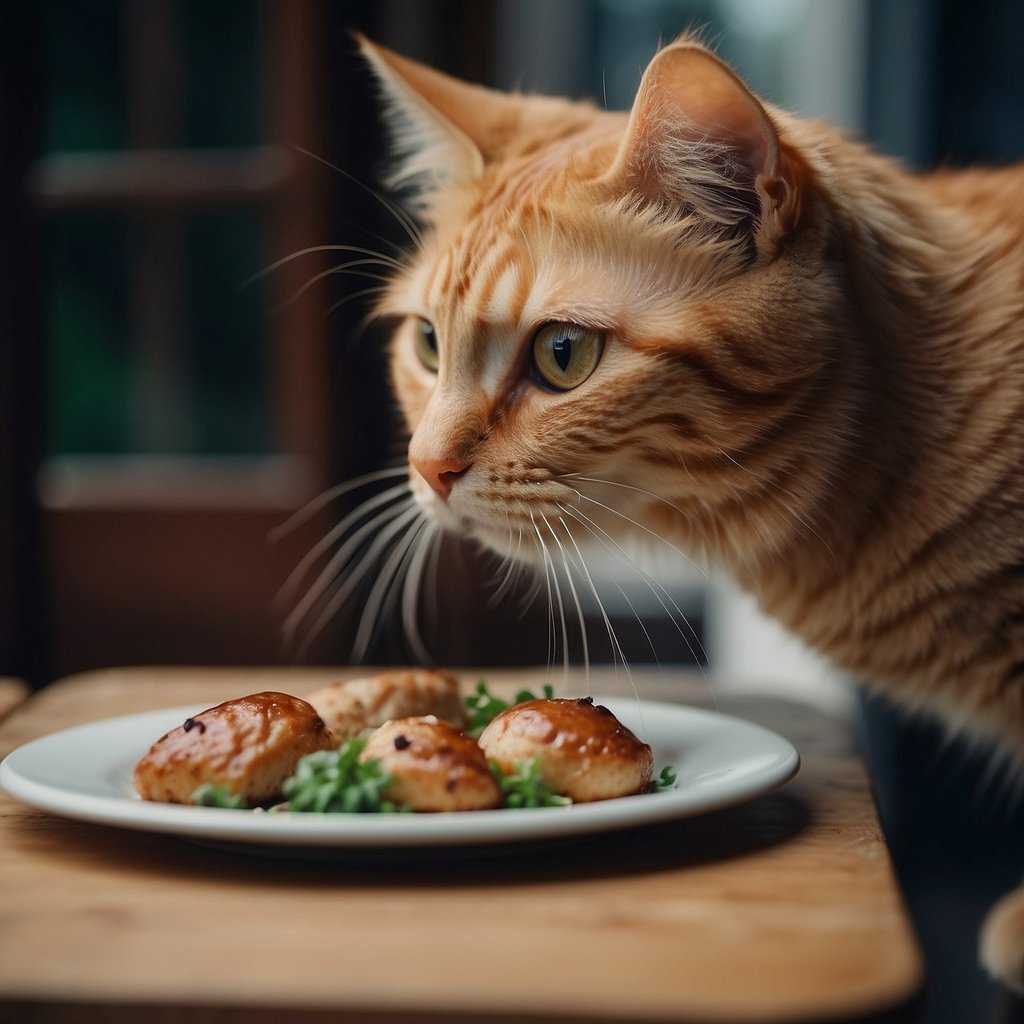
Sausages are tempting tidbits, and in moderation, a small piece of plain sausage occasionally might not be harmful.
Yet, the spices, high salt, and fat content typically found in sausages present concerns for your cat’s health. These ingredients can contribute to digestive upset or more serious health issues. (1)
Plus, any additives such as onion or garlic are toxic to cats.
So, while the base meat of sausage could technically be part of a cat’s diet, the additional ingredients utilized in typical sausage preparation make it less suitable.
When it comes to your cat’s meals, striking the right balance is key. Cats require specific nutrients found in well-formulated cat food.
Sausages, even those made from meats cats can eat, do not meet the complex needs of a feline’s diet.
Offering sausage should never replace a balanced cat food designed to meet all of their nutritional requirements.
Key Takeaways
- Cats can eat plain meat, but sausages contain ingredients that might be harmful.
- High salt and fat content, spices, and toxic additives in sausages can be unhealthy for cats.
- Sausages should not be a substitute for a balanced diet tailored to feline nutritional needs.
Health Considerations on “Can Cats Eat Sausages?”
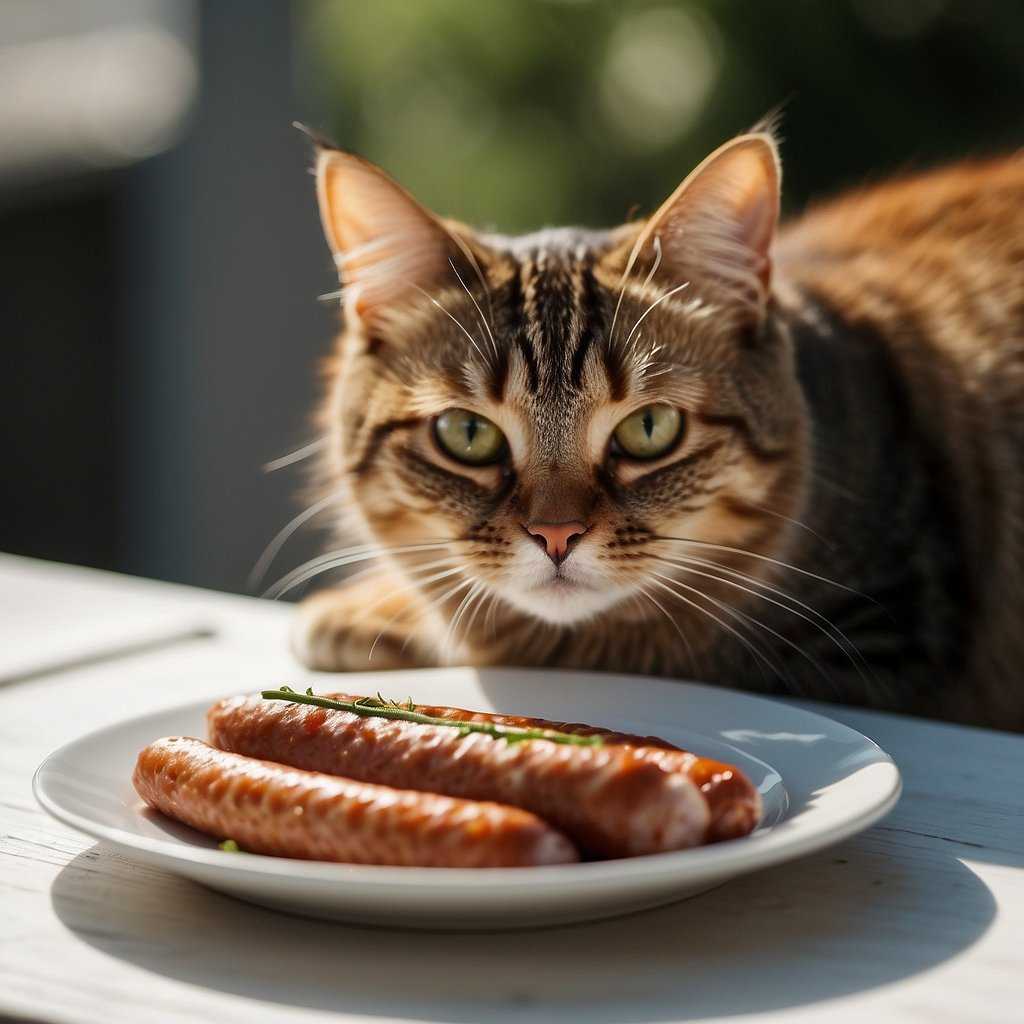
Hey there, cat parents! When it comes to sharing your breakfast sausage with your purring friend.
So, can cats eat sausages?
Here are a few things you should chew over:
Fat and Salt Content:
- Why worry? Cats, much like us, can be prone to heart disease and obesity if they gobble down too much fat and salt. (2)
- The numbers: Sausages are typically high in fat and, notably, sodium. This isn’t ideal for your feline’s diet, which requires a delicate balance more attuned to their carnivorous nature. (3)
Table: Nutritional No-nos in Regular Sausages for Cats
| Nutrient | Concern in Cats |
| Fat | Can lead to obesity and other health issues. |
| Salt | Risk of dehydration and potential for heart and kidney diseases. |
Risks of Preservatives:
- Troublesome toppers: Preservatives, like sulfites and nitrates, are often lurking in your sausage. While they keep your meats fresh, they’re not the best for your kitty’s tummy.
- What’s the big deal? These additives can cause digestive upset and, in some cases, contribute to more severe health issues.
List of Common Preservatives to Avoid in Feline Diets
- Sulfites
- Nitrates/Nitrites
Remember, occasional nibbles might be fine, but sausages shouldn’t be a staple treat. Your furry little carnivore needs a diet tailored for their species, not spiced-up human food.
So, maybe next time, entice them with a cat-friendly treat that won’t make their tail twitch in the wrong way!
Nutritional Analysis of Sausage for Cats
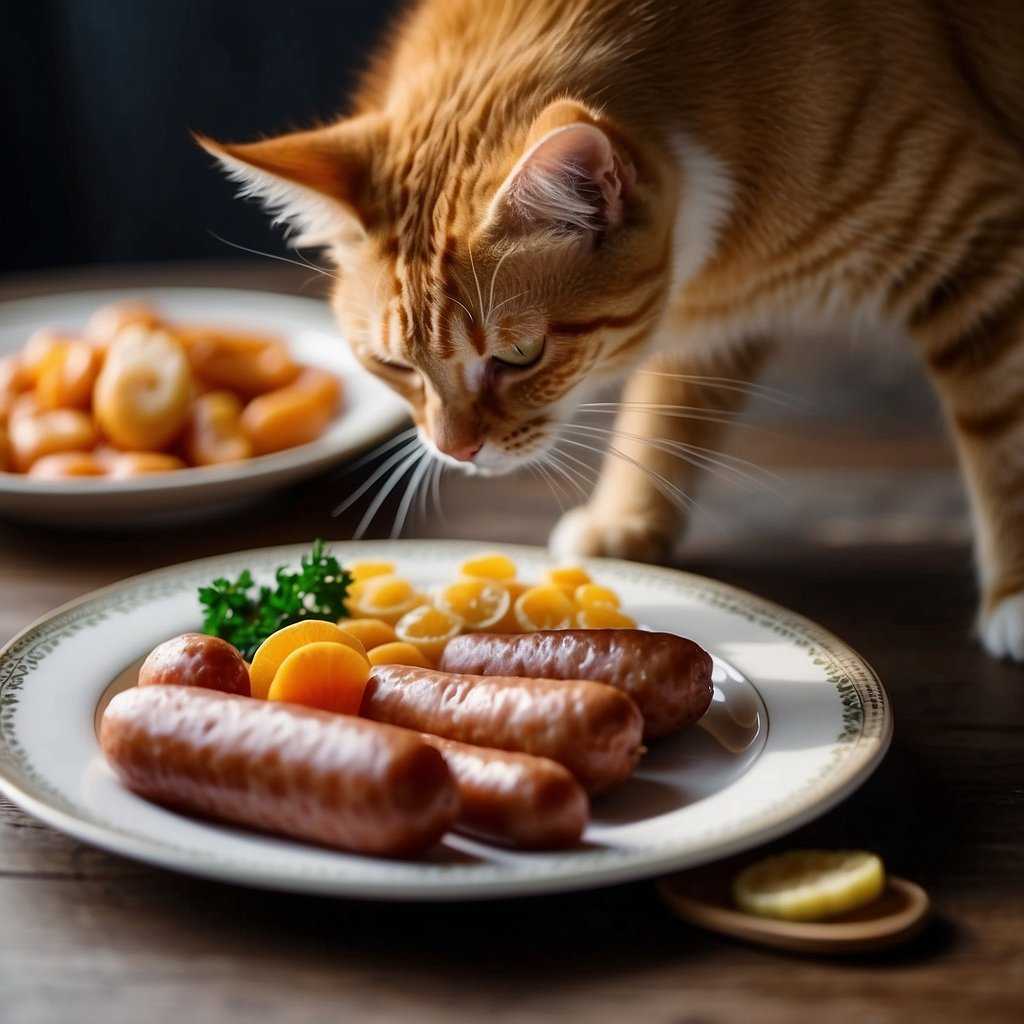
Curious if that sausage on your plate is okay to share with your feline friend? Let’s compare sausage to what your cat normally eats.
Cats require high protein, moderate fat, and low carbohydrate diets. Here’s how sausage stacks up:
| Nutrient | Sausage | Cat Food |
| Protein | High (varies by type) | Very High |
| Fat | High | Moderate to High |
| Carbs | Moderate | Low or None |
| Calories | High | Calorie-controlled |
Sausage can offer protein, which is essential; however, the protein in sausage is not as pure or beneficial as that found in cat food. (4)
Plus, sausages usually contain more fat than what your cat needs, and some versions are high in carbohydrates due to added fillers.
Regarding calories, a piece of sausage might contain a lot more than your cat’s tiny body requires—potentially leading to weight gain.
Now, as tempting as it is to toss a piece their way, you might want to think twice.
Harmful Ingredients in Sausages
Did you know sausages can harbor ingredients that are harmful to cats? Watch out for:
- Garlic and Onion: These are big no-nos! They can cause gastrointestinal upset and even lead to anemia. (5)
- High Salt and Sugar: Bad news for your kitty’s health.
- Spices: Many spices that make sausages tasty to us can disturb your cat’s stomach.
In a pinch, an incident involving a cat named Whiskers, who sneaked a garlic-laden sausage, resulted in a vet visit due to gastro distress and a case of anemia.
So can I feed my cat raw sausage? The answer is NO Pawrents. It goes the same when you want to feed them a raw diet. Raw diets usually contain bacteria that can harm their health.
You have to make sure that the raw diet you give them does not contain bacteria that could harm them.
So, remember, those tasty morsels are packed with things that could spoil more than just your cat’s appetite! Keep sausages as a rare treat, and only if they’re free of those nasty extras.
Expert Veterinary Insights and Advice
Have you ever been tempted to share your breakfast sausage with your purring companion? Veterinarians generally hold a cautious stance when it comes to cats and sausages.
Let’s break down exactly what the pros say.
What Veterinarians Say:
- “Feeding your cat sausage occasionally is fine, but it should never replace a balanced diet,” notes a vet. That’s because, while a sliver won’t hurt, a sausage is not feline food.
- Another vet warns, “Regular consumption of sausage could lead to obesity or digestive issues in cats due to high fat and sodium content.”
Remember, your furry friend relies on you for their well-being. Here’s what you need to know about sausage as a treat:
Sausages & Cats: Risks vs. Benefits
| Risks | Benefits |
| High fat content | Animal protein |
| Excessive salt | – |
| Risk of obesity | – |
| Digestive issues | – |
| Presence of preservatives | – |
Moderation is Key: Itali’s okay to give your cat a tiny piece of sausage made purely of meat, with no added preservatives or seasoning.
Just make sure it’s a very small part of their overall diet, especially if your cat has health issues or leans toward the chunkier side.
Dice it up! If you decide to give your feline a taste, cut the sausage into small, manageable pieces. This simplifies digestion and portion control, reducing the chances of any adverse effects.
In summary, while your cat can nibble on sausage as a treat, it’s not something to add to their regular menu. Stick to high-quality cat foods and consult your vet for the best cat dietary advice!
Safer Alternatives and Dietary Recommendations
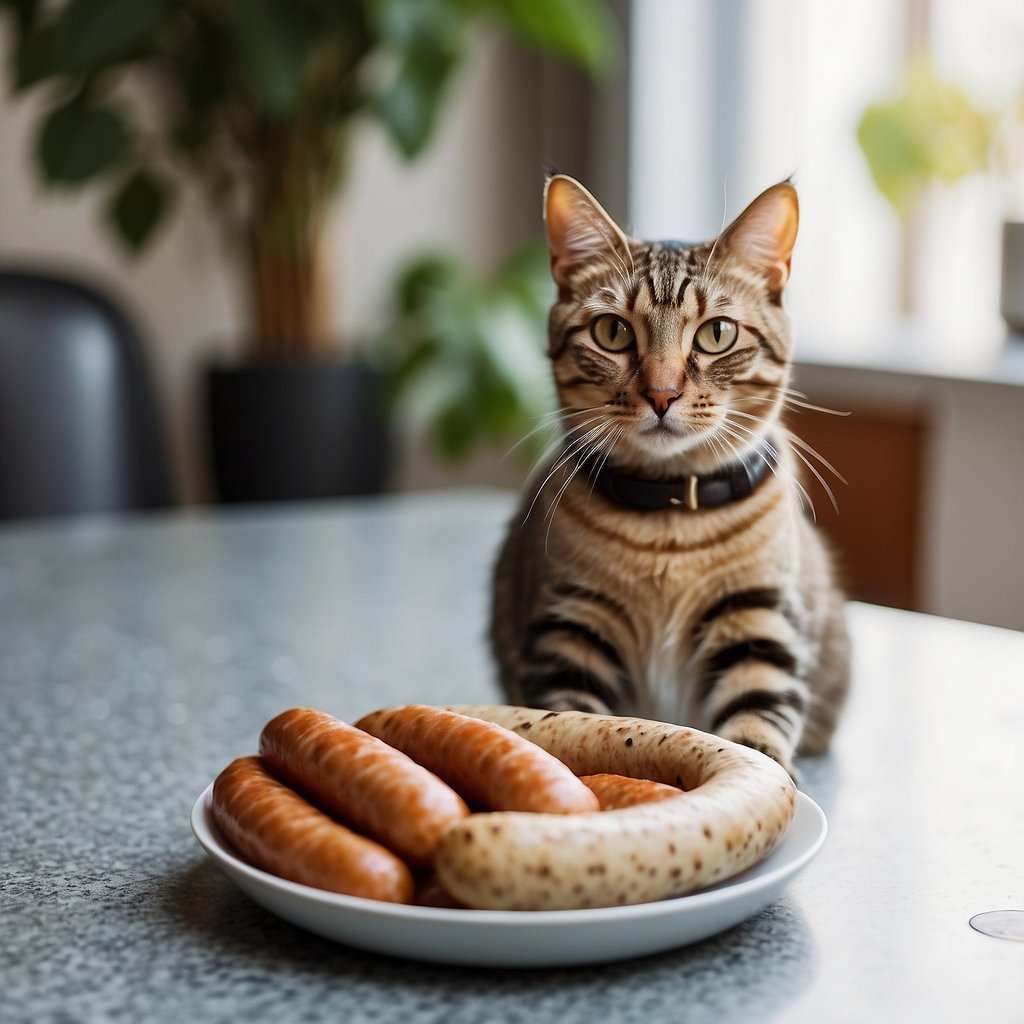
Wondering about healthier munchies for your feline friend? Your kitty may gaze longingly at your sausage, but let’s scout out some vet-approved snacks that are better for their tummy.
Healthier Alternative Foods for Cats
We all want what’s best for our furry pals, right? Slip the sausage aside and take a peek at these safer treats:
- High-Quality Commercial Cat Food: The optimal choice, specifically tailored to meet all your cat’s nutritional needs.
- Cooked Meat: Chicken or turkey, free from bones and fat, can be a yummy protein boost.
- Scrambled Eggs: A pawsome source of protein, just make sure they’re cooked without oil or seasoning. (6)
- Small Fish: Tuna or mackerel in water, served occasionally, can be a real treat!
Remember, moderation is key!
Nutritional Comparison with Sausages
Sausages sizzle with taste, but they’re also packed with:
- Fats: Way more than your cat’s diet should have.
- Salt and Spices: High amounts that are a no-no for kitty health.
- Preservatives: No, thank you. We prefer our pets’ treats without these.
In contrast, the safer alternatives listed keep it simple and healthy, snuggling closely with what’s naturally needed in your cat’s diet.
Recommended Serving Size and Frequency
“How much should I give?” you ask. Treats should only make up about 10% of your cat’s total caloric intake, say the pros. So consider this:
- One or two small pieces of meat or a spoonful of scrambled eggs can make a day’s worth.
- Occasionally: Let’s say 2-3 times a week, to keep it exciting!
Always serve treats in small portions and maintain a balanced diet overall. Got it? Purr-fect!
Your cat’s tummy and health will thank you for ditching the sausage in favor of something more purr-suited for them.
Keep your fur baby’s menu in the feel-good zone and they’ll thank you with happy meows and contented purrs. Isn’t that just the cat’s pajamas?
For more cat diet tips and to ensure your furry friend enjoys a balanced and healthy lifestyle, always opt for high-quality commercial cat food or vet-approved snacks instead of human foods like sausages.
Remember, you’re the guardian of your cat’s diet. Let’s make it count with every nibble and crunch!
Specific Types of Sausage and Their Impacts
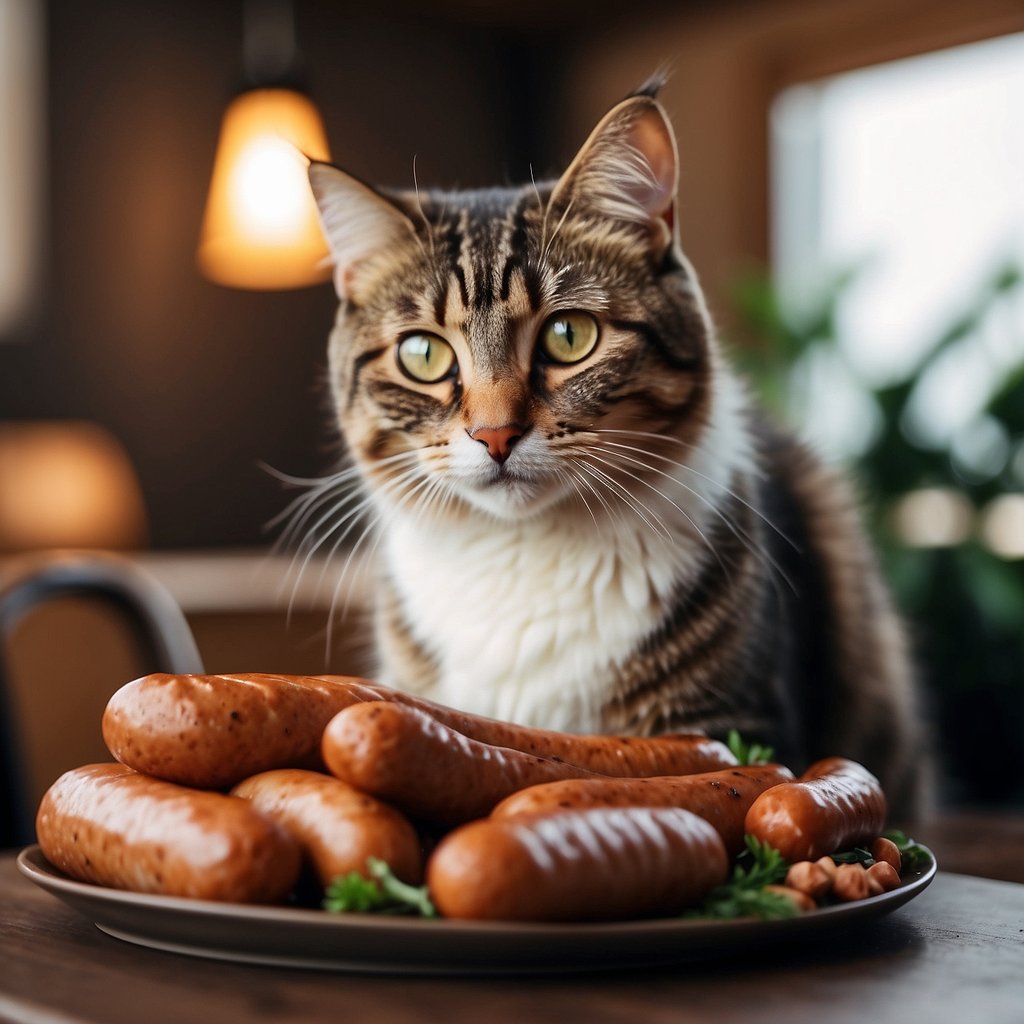
Have you ever wondered if it’s okay to sneak a little sausage to your purring friend under the table? Let’s take a closer look at different types of sausage and how they might affect your cat.
Turkey and Chicken Sausage
Turkey and chicken sausages could be a safer bet because they’re often lower in fat compared to their pork or beef counterparts. That said, they’re not all created equal.
- Nutrition: These sausages can be good sources of protein if they’re plain.
- Risks: Watch out for added salt, spices, and preservatives that can be harmful.
Beef Sausage
Hearty beef sausages are a favorite for many, but should they be one for your cat?
- Nutrition: They’ve got iron and zinc, which sound great, right?
- Risks: Unfortunately, they’re usually high in fat and salt – not so great for your feline’s health.
Selecting the Safest Options
To keep your kitty happy and healthy, here’s what you can do when considering sausage:
- Low-fat: Opt for versions with less fat.
- Low-salt: Cats have a low tolerance for salt, so the less, the better.
- Preservative-free: Skip anything with hard-to-pronounce preservatives.
Remember, small amounts as a treat might be okay, but regular sausage snacks are a no-go. When in doubt, reach for that trusty cat food —it’s specially formulated with your cat’s best health in mind, after all!
Final Thoughts and Best Practices

Have you been pondering whether a tiny bit of sausage could be your furry friend’s new favorite treat?
Well, it turns out that while your cat might eye that sausage on your plate with great interest, there are a few things you need to keep in mind before sharing.
Everything in Moderation
First things first, think moderation. Sausages are not a staple cat food, and they definitely shouldn’t replace a balanced diet specially formulated for your kitty’s needs.
- Balance Is Key: Always ensure your cat’s diet is primarily made up of complete cat food.
What’s Inside Counts
Consider the contents of a sausage: high sodium, spices, and preservatives are common and not exactly what you’d find in a cat’s natural diet. These can lead to health issues if consumed regularly.
- Ingredients To Watch: Look out for harmful additives that could upset your cat’s stomach.
Treating With Care
Thinking of treating your cat? Go ahead, but remember the word ‘treat’ implies rare occasions. If you’ve got the green light from your vet, then —
- Size Matters: Cut the sausage into small, manageable pieces.
- Fully Cooked Fare Only: Ensure any sausage is thoroughly cooked to avoid potential health risks.
So, while a nibble here and there could be fine, it’s better to stick to treats made for cats. They’re nutritionally balanced, safer, and let’s face it, designed to be just as tantalizing to those finicky feline taste buds!
Frequently Asked Questions
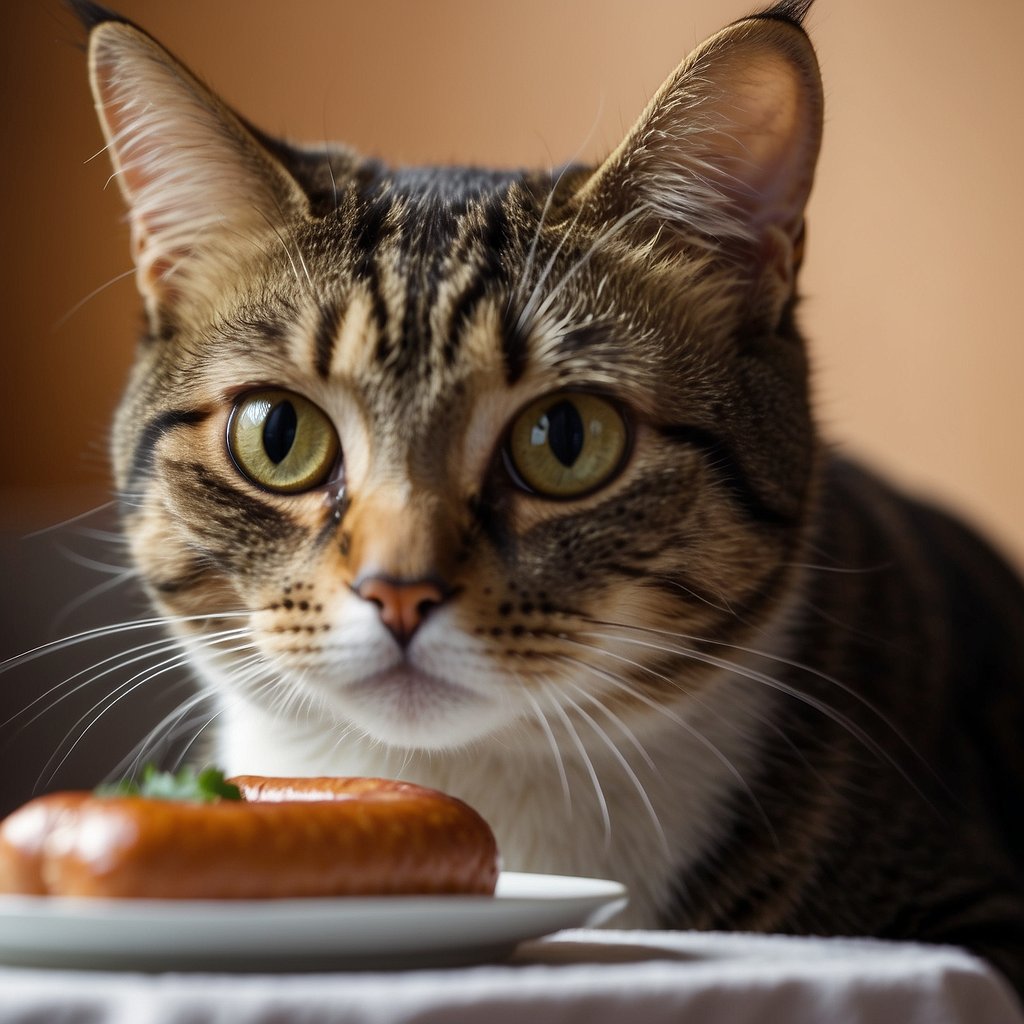
You’ve got questions, and it’s all about whether your furry friend can indulge in a bit of sausage.
We’re slicing straight into the meat of the matter with quick, no-nonsense answers to some of the most common queries cat owners have.
Is it safe to feed my cat raw sausage?
Nope, feeding your cat raw sausage is not a good idea. Raw meat can contain harmful bacteria such as Salmonella and E. coli, which could lead to food poisoning.
What are the consequences for a cat who sneaks a bit of cooked sausage?
A sneaky bite of cooked sausage usually isn’t a catastrophe, but it’s not ideal. Cooked sausage is often high in fat and salt, which can be hard on your cat’s digestive system and could lead to obesity and other health issues over time.
How does sausage affect a cat with diabetes?
If your cat has diabetes, sausage can complicate things. Its high-fat content and preservatives can disrupt blood sugar levels, making managing diabetes more challenging. It’s best to consult with your vet for suitable treats.
Are vegetarian sausages a safe option for cats?
Even vegetarian sausages can be risky as they may include onions, garlic, or spices that are toxic to cats. Plus, they lack the taurine cats need from their diet, which is found in animal-based proteins.
What are the signs of an allergic reaction to sausage in cats?
If your cat’s tummy turns against sausage, you might notice itching, swelling, gastrointestinal upset, or respiratory issues. Any allergic reaction warrants a vet visit pronto.
What are the signs of an allergic reaction to sausage in cats?
If your cat’s tummy turns against sausage, you might notice itching, swelling, gastrointestinal upset, or respiratory issues. Any allergic reaction warrants a vet visit pronto.
Can feeding sausage to my cat lead to nutritional deficiencies?
Absolutely. Sausage is not a balanced meal and lacks many of the nutrients cats require. Consistent feeding could result in a deficiency in essential vitamins and amino acids like taurine.
Are there any cat-safe sausage brands recommended by veterinarians?
Veterinarians typically won’t recommend any sausage brands for cats. They’re all about complete and balanced diets specifically formulated for feline health, so it’s best to stick to food and treats made for cats.
- Where to find the most trustworthy real money casinos - August 7, 2025
- Online Casinos That Approve PayPal: The Ultimate Overview - August 7, 2025


